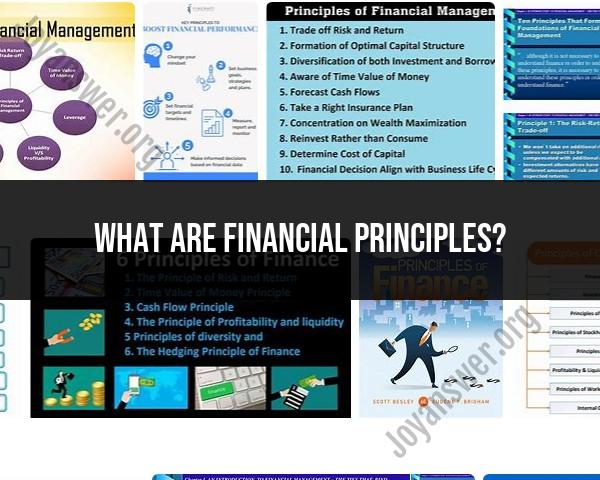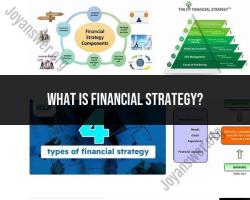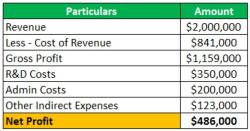What are financial principles?
Financial principles are fundamental concepts and guidelines that guide individuals, businesses, and organizations in making sound financial decisions and effectively managing their finances. These principles provide a framework for achieving financial goals, maintaining financial stability, and making informed choices about money. Here are some key financial principles:
Budgeting: Creating a budget is a foundational financial principle. It involves tracking income and expenses to plan for how money is earned and spent. A well-structured budget helps individuals and organizations allocate resources wisely and prevent overspending.
Savings: Saving money is essential for financial security and achieving long-term financial goals. The principle of saving involves setting aside a portion of income for emergencies, retirement, and other future needs.
Investing: Investing allows money to grow over time by earning a return on investments such as stocks, bonds, real estate, and other assets. Diversification and risk management are key principles of investing.
Debt Management: Managing and reducing debt is crucial for financial stability. Principles related to debt management include paying down high-interest debt, avoiding unnecessary debt, and using credit responsibly.
Emergency Fund: Maintaining an emergency fund is a financial principle that ensures individuals and organizations have a financial cushion to cover unexpected expenses or emergencies, reducing the need for debt.
Long-Term Financial Goals: Setting clear financial goals and creating a plan to achieve them is essential. Goals can include saving for retirement, buying a home, funding education, or starting a business.
Asset Protection: Protecting assets through insurance, estate planning, and risk management is a key financial principle. Adequate insurance coverage safeguards against unexpected financial losses.
Income Growth: Maximizing and growing income over time is important for achieving financial goals. This may involve career development, education, entrepreneurship, and investment in income-generating assets.
Tax Planning: Efficient tax planning helps individuals and businesses legally minimize tax liabilities by taking advantage of deductions, credits, and tax-advantaged accounts.
Financial Education: Continuously learning about financial concepts and strategies is a vital financial principle. Being well-informed empowers individuals to make informed financial decisions.
Time Value of Money: This principle recognizes that money has a different value over time. A dollar received today is worth more than a dollar received in the future, and this concept is integral to financial planning and investment decisions.
Compound Interest: Compound interest is the process of earning interest on both the principal amount and previously earned interest. It's a powerful tool for wealth accumulation over time.
Liquidity: Maintaining a balance between liquid assets (easily accessible funds) and long-term investments is crucial for financial flexibility and meeting short-term needs.
Risk Management: Identifying and managing financial risks is essential. Risk management principles include diversification, asset allocation, and insurance.
Ethical and Responsible Financial Practices: Practicing ethical and responsible financial behavior is a core principle. It involves honesty, integrity, and ethical decision-making in all financial matters.
These financial principles are the building blocks of effective financial management and decision-making. Applying them helps individuals and organizations achieve financial well-being, reduce financial stress, and work toward their financial goals.
What are the fundamental financial principles that underlie sound money management?
The fundamental financial principles that underlie sound money management are:
- Spend less than you earn. This is the most important principle of sound money management. If you spend more than you earn, you will eventually go into debt.
- Save for the future. It is important to save money for the future, both for short-term goals, such as a down payment on a house, and for long-term goals, such as retirement.
- Invest your money wisely. Investing is a great way to grow your money over time. However, it is important to invest wisely and to understand the risks involved before you invest any money.
- Manage your debt wisely. If you have debt, it is important to manage it wisely. This means making your payments on time and in full, and working to pay off your debt as quickly as possible.
- Protect your assets. It is important to protect your assets, such as your home, car, and savings, from unexpected events. This can be done through insurance and other financial planning strategies.
How do financial principles guide decision-making in personal finance and investing?
Financial principles can guide decision-making in personal finance and investing in a number of ways. For example, the principle of "spend less than you earn" can guide your decision-making about how to budget your money and how much to spend each month. The principle of "save for the future" can guide your decision-making about how much to save each month and how to invest your savings. The principle of "invest your money wisely" can guide your decision-making about which investments to choose and how to manage your investment portfolio.
What are the key principles for maintaining financial stability and security?
The key principles for maintaining financial stability and security are:
- Have a budget. A budget is a plan for how you will spend your money each month. Having a budget can help you to track your spending and make sure that you are not spending more than you earn.
- Have an emergency fund. An emergency fund is a savings account that you can use to cover unexpected expenses, such as a job loss or a medical emergency. Aim to have at least 3-6 months of living expenses saved in your emergency fund.
- Pay off debt. Debt can be a major financial burden. If you have debt, make a plan to pay it off as quickly as possible. This will free up your income and improve your financial stability.
- Invest for the future. Investing is a great way to grow your money over time and reach your financial goals. Start investing early and invest regularly, even if it is just a small amount each month.
- Protect your assets. It is important to protect your assets from unexpected events, such as a lawsuit or a natural disaster. Consider purchasing insurance and other financial planning strategies to protect your assets.
By following these financial principles, you can achieve financial stability and security.











